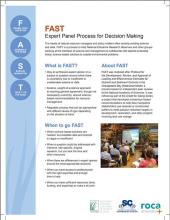
About this resource
The needs of natural resource managers and policy makers often outstrip existing science and data. FAST is a process to help National Estuarine Research Reserves and others working at the interface of science and management to collaborate with experts to develop timely, science-based solutions to environmental problems. It provides an iterative, weight-of-evidence approach for these experts to reach general agreement, though not necessarily unanimity, around technical recommendations.
FAST is helpful when science-based solutions are needed, but data and research are vague or insufficient. For example, it may be appropriate when a question could be addressed with intensive site specific research, but time or other resources are lacking. Alternatively, you may want to use it when there are differences in expert opinion around the most appropriate solution. FAST is adaptable and can be approached with different levels of rigor depending on the situation at hand. It can only work if you have sufficient resources and access to professionals with the right expertise and time to help.
FAST was refined as part of Credit for Going Green, a project that developed consensus-based recommendations to help New Hampshire stakeholders use buffers to meet pollution reduction targets for stormwater permits. The project team synthesized their experience into a four-stage process for working with expert panels. FAST is not unique; it incorporates common best practices from other approaches to group decision making. This guide is for people who would like to use and adapt these techniques when engaging experts. It includes lessons learned, tools, and sample work products generated by the Going Green team.
Facilitation Guides
- FAST Guide: Twelve-page guide to the expert process for those interested in applying this approach to another management question
- FAST Overview: Two-page overview of the expert panel process for anyone interested in how the panel reached its decisions
Primary Authors and Project Leads:
Cory Riley, Great Bay National Estuarine Research Reserve
Dolores Leonard, Roca Communications
James Houle, University of New Hampshire